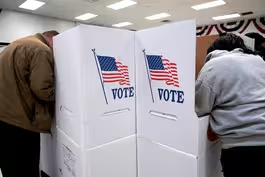
How a trailblazing Black lawyer took down a top mafia boss
Clip: 2/4/2023 | 5m 24sVideo has Closed Captions
How a trailblazing Black lawyer took down a top New York City mafia boss
This Black History Month, PBS News Weekend is highlighting stories of Black Americans whose lives and work are lesser known — their accomplishments all the more significant because they were made in the face of injustices and discrimination. In the first part of our series, “Hidden Histories,” we look at the story of Eunice Carter, who helped take down one of America’s most notorious mob bosses.
Problems playing video? | Closed Captioning Feedback
Problems playing video? | Closed Captioning Feedback
Major corporate funding for the PBS News Hour is provided by BDO, BNSF, Consumer Cellular, American Cruise Lines, and Raymond James. Funding for the PBS NewsHour Weekend is provided by...

How a trailblazing Black lawyer took down a top mafia boss
Clip: 2/4/2023 | 5m 24sVideo has Closed Captions
This Black History Month, PBS News Weekend is highlighting stories of Black Americans whose lives and work are lesser known — their accomplishments all the more significant because they were made in the face of injustices and discrimination. In the first part of our series, “Hidden Histories,” we look at the story of Eunice Carter, who helped take down one of America’s most notorious mob bosses.
Problems playing video? | Closed Captioning Feedback
How to Watch PBS News Hour
PBS News Hour is available to stream on pbs.org and the free PBS App, available on iPhone, Apple TV, Android TV, Android smartphones, Amazon Fire TV, Amazon Fire Tablet, Roku, Samsung Smart TV, and Vizio.
Providing Support for PBS.org
Learn Moreabout PBS online sponsorshipJOHN YANG: Since President Gerald Ford first recognized it in 1976, February has been celebrated as Black History Month.
For the next four weekends, we're going to bring you stories of black Americans whose lives and whose work are lesser known, their contributions all the more significant because they were accomplished in the face of injustice and discrimination.
Tonight, the story of a woman who helped take down one of America's most notorious mob bosses.
It's part one of our series, Hidden Histories.
Eunice Carter always understood the power of public service.
When she was seven years old, her parents, both social activists, fled the south after the 1906 Atlanta race riots, moving the family to Brooklyn, New York.
SHAKALA ALVARANGA, Director of Public Programs, The Mob Museum: She was ahead of her time.
JOHN YANG: Shakala Alvaranga is the Director of Public Programs at the Mob Museum in Las Vegas.
SHAKALA ALVARANGA: Her father, William Hunton Sr., he founded the black division of the YMCA.
And her mother was a social worker, an activist, and a political organizer.
And she also worked for the YMCA's war efforts during World War I.
And she was one of the women assigned to work with about 200,000 segregated black troops who were stationed in France at the time.
So her family history holds a lot of depth and a lot of history when it comes to civil rights.
JERMAINE FOWLER, Author, "The Humanity Archive": So, this is the example that Carter is growing up in, and this is who she looks to for inspiration.
JOHN YANG: Jermaine Fowler is the author of The Humanity Archive, which highlights the achievements of black Americans that history books have long ignored.
Her family also made sure she got a good education.
JERMAINE FOWLER: She went to Smith College.
She was only the second black woman to receive a bachelor and a master's degree in four years in 1921.
And then she entered Fordham Law school as the first black woman to graduate from that school.
JOHN YANG: She became an assistant district attorney, mostly working at what was then called Women's Court, prosecuting sex workers.
Her talents came to the attention of Thomas E. Dewey, then beginning his rise to national prominence as a New York State special prosecutor going after organized crime.
Carter joined his otherwise all white, all male team.
SHAKALA ALVARANGA: They, you know, kind of had this unconventional relationship, but Dewey clearly knew how talented and how educated Eunice Carter was.
She was out in the community, and a lot of people were talking to her, and they may have not felt as comfortable talking to the men about, you know, what they were doing.
JOHN YANG: She was paid less than her male counterparts and passed over for promotions.
But her experience in women's court gave her knowledge they didn't have.
JERMAINE FOWLER: She noticed that women being arrested for prostitution from all over new York City were being represented by the same lawyers and the same bails bondsman.
JOHN YANG: She meticulously followed the connections back to the reigning boss of Mafia bosses, Charles "Lucky" Luciano.
JERMAINE FOWLER: Luciano is this very savvy businessman, but he's also a ruthless Mafia also.
And what we know of as the Mafia today was started by Luciano, who consolidated these blood Fu-wing gangster families during the Prohibition era into one centrally supervised criminal syndicate.
SHAKALA ALVARANGA: After months of interviewing and wiretapping, Carter and her colleague at the time, they convinced Dewey that organized crime essentially controlled the brothels.
They would pocket about $40 of their $200 weekly earnings.
And in contrast, Luciano earned millions every year.
JOHN YANG: Carter spearheaded an investigation that included raids on brothels across New York City.
The evidence gathered led to Luciano's 1936 conviction on more than 60 counts of forced prostitution.
He was sentenced to 30 to 50 years in prison.
This episode really helped establish Thomas Dewey nationwide ran for political office.
He was a presidential candidate.
How much credit did Eunice Carter get in all of this?
JERMAINE FOWLER: We kind of see her overlooked, and it's really just within the last few years that we're recovering her legacy and her contributions to this case and this grant end place that she holds in American history in terms of prosecution and going against organized crime.
JOHN YANG: After leaving the government, Carter entered private practice.
She was active in the YWCA, the NAACP, and was an advisor to the United Nations.
But it was her work in the Luciano case, helping get justice for the women he abused that cemented Carter's legacy and earned her the title, Lady Racketbuster.
SHAKALA ALVARANGA: She was able to really hone in and really put this case together in a way that only she could do.
Expert warns of AI tools’ potential threat to democracy
Video has Closed Captions
Clip: 2/4/2023 | 6m 7s | Security expert warns of AI tools’ potential threat to democracy (6m 7s)
Fear, violence and chaos grip Haiti as gangs seize control
Video has Closed Captions
Clip: 2/4/2023 | 8m 36s | Fear, violence and chaos grip Haiti as gangs seize control (8m 36s)
Providing Support for PBS.org
Learn Moreabout PBS online sponsorship
- News and Public Affairs

FRONTLINE is investigative journalism that questions, explains and changes our world.

- News and Public Affairs

Today's top journalists discuss Washington's current political events and public affairs.












Support for PBS provided by:
Major corporate funding for the PBS News Hour is provided by BDO, BNSF, Consumer Cellular, American Cruise Lines, and Raymond James. Funding for the PBS NewsHour Weekend is provided by...

